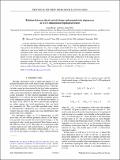Relation between chiral central charge and ground-state degeneracy in ( 2 + 1 ) -dimensional topological orders
Author(s)
Kong, Liang; Wen, Xiao-Gang
DownloadPublished version (411.2Kb)
Publisher with Creative Commons License
Publisher with Creative Commons License
Creative Commons Attribution
Terms of use
Metadata
Show full item recordAbstract
A bosonic topological order on $d$-dimensional closed space $\Sigma^d$ may
have degenerate ground states. The space $\Sigma^d$ with different shapes
(different metrics) form a moduli space ${\cal M}_{\Sigma^d}$. Thus the
degenerate ground states on every point in the moduli space ${\cal
M}_{\Sigma^d}$ form a complex vector bundle over ${\cal M}_{\Sigma^d}$. It was
suggested that the collection of such vector bundles for $d$-dimensional closed
spaces of all topologies completely characterizes the topological order. Using
such a point of view, we propose a direct relation between two seemingly
unrelated properties of 2+1-dimensional topological orders: (1) the chiral
central charge $c$ that describes the many-body density of states for edge
excitations (or more precisely the thermal Hall conductance of the edge), (2)
the ground state degeneracy $D_g$ on closed genus $g$ surface. We show that $c
D_g/2 \in \mathbb{Z},\ g\geq 3$ for bosonic topological orders. We explicitly
checked the validity of this relation for over 140 simple topological orders.
For fermionic topological orders, let $D_{g,\sigma}^{e}$ ($D_{g,\sigma}^{o}$)
be the degeneracy with even (odd) number of fermions for genus-$g$ surface with
spin structure $\sigma$. Then we have $2c D_{g,\sigma}^{e} \in \mathbb{Z}$ and
$2c D_{g,\sigma}^{o} \in \mathbb{Z}$ for $g\geq 3$.
Date issued
2020Department
Massachusetts Institute of Technology. Department of PhysicsJournal
Physical Review Research
Publisher
American Physical Society (APS)